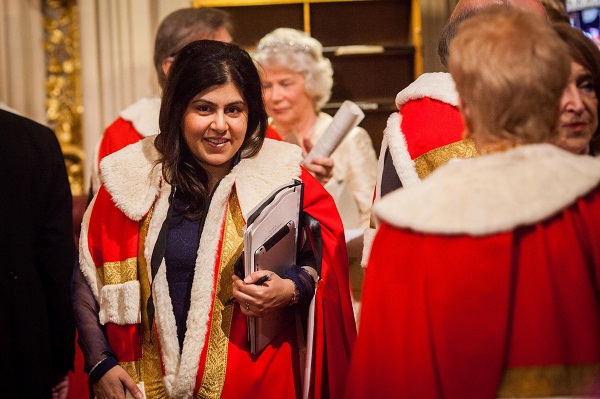[audioplayer src=”http://traffic.libsyn.com/spectator/TheViewFrom22_07_August_2014_v4.mp3″ title=”Douglas Murray and Tim Stanley discuss Baroness Warsi’s resignation” startat=462]
Listen
[/audioplayer]Now that Baroness Warsi has revealed her letter to the Prime Minister in which she resigns over Gaza, here are the key criticisms that she levels at the government. They are notably not just about Operation Protective Edge and the British government’s response to it. She doesn’t resign until the penultimate paragraph, after a long letter that is clearly designed to cause maximum damage.
1. British policy in the Middle East generally is ‘morally indefensible’.
Warsi includes the current conflict in that, and warns that it could wreak long-term on Britain’s international reputation:
‘My view has been that our policy in relation to the Middle East Peace Process generally but more recently our approach and language during the current crisis in Gaza is morally indefensible, is not in Britain’s national interest and will have a long-term detrimental impact on our reputation internationally and domestically.’
She accuses the government of betraying its own values, saying ‘I believe our approach in relation to the current conflict is neither consistent with our values, specifically our commitment to the rule of law and our long history of support for international justice’.
2. The reshuffle damaged the government’s efficacy.
She points particularly to the sackings of two experienced – and moderate – colleagues, saying:
‘In many ways the absence of the experience and expertise of colleagues like Ken Clarke and Dominic Grieve has over the last few weeks become very apparent.’
It is one thing to thank colleagues for the experience they have brought to government, quite another to suggest that the government is now weak and making poor decisions because they are not there.
3. The Foreign Office – including other ministers – was uneasy about the decisions being taken.
‘There is however great unease across the Foreign Office, amongst both Ministers and senior officials, in the way recent decisions are being made’.
Warsi suggests that her ministerial colleagues were unhappy about decisions. They will now certainly all be asked whether or not they were.
4. Gaza could become a basis for radicalisation.
This is an interesting line, given Warsi was reportedly opposed to the Prime Minister’s strategy for tackling non-violent extremism. She argues that ‘early evidence from the Home Office and others shows that the fallout of the current conflict and the potential for the crisis in Gaza and our response to it becoming a basis for radicalisation could have consequences for us for years to come’.
5. Conditional support for the Prime Minister.
The big question is what on earth is Warsi going to do next? Will she publish those diaries? Will she give a really awkward interview to a newspaper or broadcaster? Will she continue to support David Cameron? She uses her closing paragraph to give Cameron some indication, and it hinges on a condition:
‘You will continue to have my personal support as leader of the Conservative Party as you continue to ensure that our Party evolves to meet the challenges we face in Britain today and ensure that the Party is relevant and responsive to all communities that make up today’s Britain.’
That ‘as’ (my emphasis) functions as the ‘if’ in this sentence. If David Cameron ensures his party modernises and appeals to all communities, then Warsi can support him. But if he does not, then presumably she can argue in public that the Tories are stuck in the past and that they offer nothing for the ethnic minority communities they want to attract.
She does praise her colleagues William Hague and Eric Pickles. But there is nothing in there that praises the Prime Minister at all, other than that it has been a privilege to serve in his Shadow Cabinet and Cabinet.







Comments